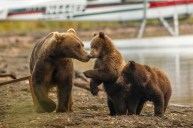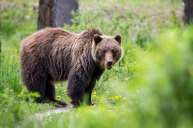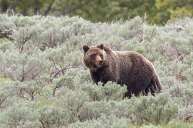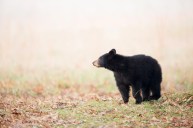Wildlife officials say a hunter mistakenly shot a grizzly bear while looking for black bears in Idaho's Panhandle Region. According to an announcement, the incident happened on June 10 in an area not commonly used by grizzlies.
In the statement, Idaho Fish & Game explained that after the hunter killed the bear, he realized it was a grizzly and contacted wildlife authorities. The agency said the man is cooperating with the investigation.
Officials say the incident happened in the Panhandle Region known as Unit 6. According to the Idaho Hunt Planner, Unit 6 spans four counties in the center of the Panhandle. These include St. Maries, Wallace, Potlatch, and Headquarters.
While private owners and the U.S. Forest Service manage about 86% of the land, the state manages 10.06%. On that land, the state allows an assortment of hunting, including bears, which has a season that runs from April 15 to June 30.

Credit: IDFG
Where are all the grizzly bears in Idaho
Most of Idaho's grizzly bear population resides in the northern Panhandle area and in and around Yellowstone National Park in the eastern part of the state. However, young male grizzlies, like the one killed, typically wander away from those areas, but won't remain there.
According to state wildlife officials, there are approximately 30,000 black bears in Idaho. However, Idaho has maybe 100 grizzlies out of the nearly 2,000 in the lower 48 states. Therefore, the federal government considers the animal a protected species, meaning killing one could result in federal criminal charges.
Because the consequences are so high, Idaho wildlife officials say they encourage all black bear hunters to brush up on their bear identification skills to avoid mistaken identity.
According to Idaho wildlife officials, size and color are not reliable indicators of a bear species. Some grizzly bears might be darker and some black bears might be lighter.
"It's best to look at multiple features in order to make the right call," officials say. Describing a grizzly bear's features, they say it has short, rounded ears, a dished facial profile, a prominent shoulder hump, and two- to four-inch claws.




